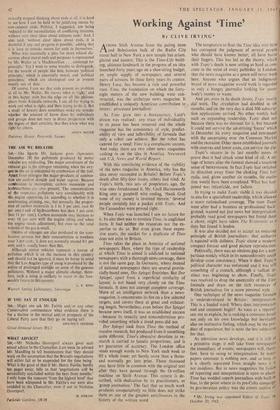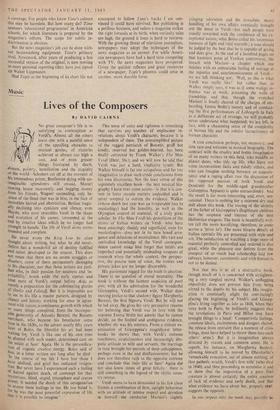Working Against 'Time'
By CLIVE IRVING*
ACROSS Sixth Avenue from the paling neon /A. and Babylonian bulk of the Radio City music hall in New York a new temple has arisen, glacial and austere. This is the Time-Life build- ing, ultimate landmark in the progress of an idea launched forty years ago on a shoe-string budget, an ample supply of newspapers and several pairs of scissors. In those forty years its creator, Henry Luce, has become a rich and powerful man. Time, the foundation on which the forty- eight storeys of the new building were con- structed, was the archetype news magazine. It established a uniquely American contribution to letters : processed journalism:
As Time grew into a bureaucracy, Luce's dream was realised : any trace of individuality in its prose has been removed and the whole magazine has the consistency of style, predict- ability of view and inflexibility of formula that
• only a robot can achieve. But the robot has catered for a need; Tune is a complacent success, And today there are two other news magazines cashing in on the idea in America. Newsweek and U.S. News and World Report.
With this convincing evidence of the viability of the news magazine in America, why has the idea never succeeded in Britain? Before Topic's death after fifty-four issues, others had tried. At Topic's birth, two sets of proprietors ago, the wise ones foredoomed it. Mr. Cecil Harmsworth King sent a goodwill wire ending, 'thank God none of my money is invested therein.' Several people certainly lost a packet with Topic. And the Cassandras were proved right.
When Topic was launched I saw no future for it. Its aim then was to emulate Time, in anglicised form. it had neither the resources nor the ex- pertise to do so. But even given these expen- sive assets, the market for a duplicate of Time does not exist in Britain.
Time takes the place in America of national newspapers. Here, where the type of readership at which Time is aimed is addicted to national newspapers with a thorough news coverage, there• is not the same gap. In Germany, where instead of national newspapers there are several provin- cially-based ones, Der Spiegel flourishes. But Der Spiegel, apart from a superficial similarity of layout, is not based very closely on the Time formula. It does not attempt complete coverage. More of an intelligence network than a news- magazine, it concentrates its fire on a few selected targets, and covers these at great and exhaust- ing length. Nevertheless, even before Der Spiegel became news itself, it was an established success —because its tenacity and nonconformism pro- vided something which a timid press did not.
Der Spiegel took from Time the method of massive research, but produced from it something quite different. Time's obsessive devotion to re- search is carried to lunatic proportions, and is no guarantee of accuracy. The London office sends enough words to New York each week to fill a whole issue; yet barely more than a thous- and normally get into print. Those thousand may have little in common with the original text after they have passed through the Orwellian machine on Sixth Avenue. This system is de- scribed, with dedication by its practitioners, as 'group journalism,' The fact that so much work produces comparatively so little does not strike them as one of the greatest anticlimaxes in the history of the written word. The temptation to float the Time idea over here has corrupted the judgment of several people who should have known better; all have burnt
their fingers. This has led to the theory, which with Topic's death is now setting as hard as con- crete in the mind of every publisher in London,
that the news magazine as a genre will never work here. Anyone who argues that an indigenous brand of news magazine would work is regarded as only a hungry journalist looking for some- body's money to waste.
And yet, even in its death throes, Topic nearly did work. The circulation had doubled in siX
months, and on the very day it died 300 subscrip- tion applications arrived. No other weekly had such an expanding readership. Topic died not because there was no demand for it, but because it could not survive the advertising 'freeze' which in December hit every magazine and newspaper
with the uncertainty over the Common Market and the recession. Other more established journals, with reserves and lower costs, can survive the dip. Topic's success in its last months seems. to prove that it had struck some kind of oil. A de- luge of letters after the funeral showed a touching sense of bereavement. In fact Topic had switched its direction away from the choking Time for- mula, and, given another six months, the evolu- tion would have been completed. What has hap- pened was infanticide, not failure.
In trying to make Topic viable it was decided to aim for a specialised readership, which allowed a more rationalised coverage. The man Topic went after had a business or professional. back- ground, wanted not just news but interpretation.
probably read good newspapers but found thent a chore, might have taken, The Economist as a duty but found it leaden.
It was also decided not to accept an enduring principle of British journalism: that authority is equated with dullness. Topic chose a modern,
compact format and good picture reproduction. Politically, there was an obvious gap for a non- partisan weekly which in its nonconformity could
develop some consistency.. When it died, Topic-5 political character was unformed and it was still something of a• eunuch, although a radical in- stinct was beginning to show. Finally, Topic was resolved -to drop the anonymity of the Tint(' formula and draw on the rich resources of British journalism for a more personal style.
One technique of 'the news magazine formula is underdeveloped in Britain : interpretation.
This is a loaded word. Where does interpretation end and comment begin? As soon as a reporter sets out to explain, he is making a comment based
not only on his own knowledge but inevitablY also on instinctive feeling, which may be the pro- duct of experience, but is none the less subjective for that.
As television news develops, and it is still at a primitive stage, it will take from newspapers the immediacy of events; newspapers will, there-
fore, have to swing to interpretation. In new's' papers comment is nothing new, and so long as it is clearly separated from straight news it i5 not insidious. But in news magazines the fusiOn of reporting and interpretation is open to abuse. Time has wedded superb journalism with built-in bias, to the point where in its pre-Cuba campaign its pro-invasion policy was the covert motive of * Mr. Irving was appointed Editor of Topic on October 20, 1962. it coverage. For people who know Time's colours this may be harmless. But how many do? Time sponsors 'educational programmes' in American schools, for which literature is prepared by the magazine's editors. The scope for subtle in- doctrination is obvious.
But the news magazine's job can be done with- out brainwashing equipment. Time's primary rival, Newsweek, after years of producing a less successful version of the original, is now moving to more personal reporting (they have just signed up Walter Lippmann).
Had Topic at the beginning of its short life not attempted to follow Time's tracks I am con- vinced it could have survived. But publishing is a perilous business, and unless a magazine strikes the right formula at its birth, when curiosity sales are high, the ground it loses is hard to retrieve, With the growing threat of television journalism, newspapers may adopt the techniques of the news magazine as an answer. For while Ameri- can newspapers have had a hard time competing with TV, the news magazines have prospered. Given the quicker reflexes and great resources of a newspaper, Topic's phoenix could arise in another, more durable form.































 Previous page
Previous page